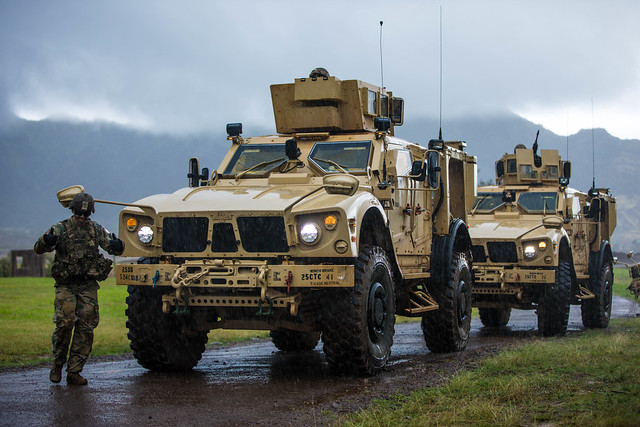
Soldiers from the 524th Combat Sustainment Support Battalion, 25th Sustainment Brigade, 25th Infantry Division, conduct convoy live fire operations on Schofield Barracks, Hawaii, May 1, 2019. (U.S. Army photo by the 25th Sustainment Brigade Public Affairs Office)
Santiago Hernandez
Energy Conservation
U.S. Army Garrison Hawaii Directorate of Public Works
SCHOFIELD BARRACKS, Hawaii -- Training to conserve energy during peacetime will help save Soldier lives during combat operations.
For the reader who thinks otherwise -- that energy conservation efforts are a waste of time and they interfere with mission capabilities -- this article is especially for you.
According to the Army Energy Security Implementation Strategy, written by the Army Senior Energy Council in 2009, “lowering tactical fuel demands would place fewer Soldiers in harm’s way during logistical support operations in theater.”
“The central role of energy security for operational missions was highlighted in 2006 when the commanding general of the multi-national force in western Iraq submitted a priority request to reduce the number of fuel logistic convoys,” the strategy continued. “Although necessary, these convoys and the associated logistical fuel tail were increasingly vulnerable to attack and had the potential to jeopardize mission success. This vulnerability points to a potential asymmetric advantage for the adversary.”
In combat, even the enemy gets a vote.
Unfortunately for us, his vote leans toward the notion that more energy consumed by deployed units presents a greater opportunity of attacking more logistical convoys – therefore, the probability of losing U.S. Soldiers is increased.
Unfortunately, when U.S. forces in theater overuse, waste, misuse and abuse energy, the enemy is the only one who stands to benefit from it.
What if during redeployment periods, units trained to use less energy in training and garrison operations?
Basically that training would mean increasing Soldier awareness, generating less waste, and reducing misuse in combat, thus, less logistical convoys exposed to enemy fire.
Is it a farfetched idea to think so? What if we were able to save just one life, or prevent one person from being injured by an IED explosion; would it be worth considering?
In order to work, Army leaders and Soldiers at all levels, regardless of their military occupational skill, or MOS, have to seriously adopt a “Train to Save Energy” when you “Train as You Fight” mentality and assume ownership of the concept.
Any effort to conserve energy must never interfere with the unit’s mission, safety or Soldier welfare. The conservation of fuel being referred to is the one that burns unnecessarily: lights that continuously burn on during the day, air conditioning systems running 24/7, non-stop water leakages, excessive use of cold and hot water, etc.
Ultimately, the conservation goal is not to sacrifice comfort or to compromise the mission. It is to minimize and eliminate wasteful practices.
Leaders at all levels should start by promoting ownership of the idea and give Soldiers an opportunity to see leaders leading by example.
“Taking ownership leads to accountability and a culture change for Army personnel,” according to the Army Energy Security Implementation Strategy. “Ownership comes from knowledge, training, and operational awareness of the importance of energy to all aspects of the Army mission.”
Training Soldiers at home to use less energy tactically and administratively can help reduce logistical requirements in combat – essentially reducing Soldier exposure to the enemy.
Simply turning items off when not in use is a demonstration of energy conservation and doing the right thing.
Is energy conservation a combat multiplier?
That would depend on who you ask. In 2006, if you were the Multi-National Division-West commander in Iraq, how would you respond to a logistical convoy issue?
Truth is, less fuel and water requirements reduce the demand for logistical convoys. It lessens the possibility of jeopardizing the mission and the very safety of our greatest asset: the American warfighter.
“You will not find it difficult to prove that battles, campaigns, and even wars have been won or lost primarily because of logistics.” – Gen. Dwight D. Eisenhower




